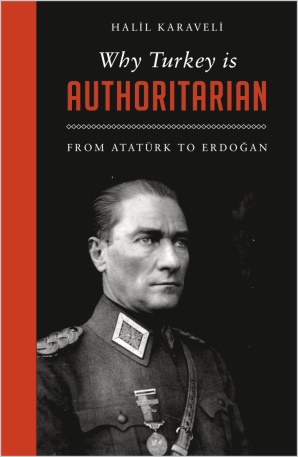Why Turkey Is Authoritarian
Why Turkey is Authoritarian
RIGHT-WING RULE FROM ATATÜRK TO ERDOGAN
Pluto Press
Distributed in the USA by the University of Chicago Press
Assassination in Ankara
Op-Ed, Foreign Affairs, January 3, 2017
Halil M. Karaveli, Assasination in Ankara
On December 19, Mevlut Mert Altintas, a Turkish police officer, assassinated Andrei Karlov, Russia’s ambassador to Turkey. His action was apparently meant as retribution for Russian bombings in eastern Aleppo, and he is the latest in a string of right-wing terrorists in Turkeywhose acts have served to draw Ankara back toward the West. Less than two weeks after the assassination, in the early hours of January 1, a gunman believed to have been affiliated with the Islamic State (ISIS) killed at least 39 people at an Istanbul nightclub. If such attacks continue, as they very likely will, they could undermine Erdogan's grip on power, which is what the wave of terror is all about, even if the perpetrators differ.
At this stage, it is impossible to know Altintas’ precise intention, whether he was a “lone wolf” or was directed by others, and what consequences the murder will have. But historical patterns offer some clues. First, Turkey has seen a long line of high-level assassinations carried out by the country’s right wing, made up of Sunni Islamists and Turkish nationalists, who have always been aligned in Turkish politics. The killers have typically had connections—a direct one in the case of Altintas, who was a riot police officer—with the country’s security agencies. Second, assassinations have tended to take place in particular geopolitical circumstances, namely whenever Turkey’s long-standing commitment to the Western security alliance has seemed to be in jeopardy. Read more
Erdogan’s Journey – Conservatism and Authoritarianism in Turkey
Essay, Foreign Affairs, November/December 2016 Issue
Halil M. Karaveli, Erdogan's Journey
What happened to Recep Tayyip Erdogan? The Turkish president came to power in 2003 promising economic and political liberalization. But under his rule, Turkey has instead moved in a profoundly illiberal, authoritarian direction—although not toward repressive Islamism, which some feared was Erdogan’s true agenda, given his background in Islamist politics. Rather, Erdogan has become something more akin to a traditional Middle Eastern strongman: consolidating personal power, purging rivals, and suppressing dissent.
Over the summer, it briefly appeared as if Erdogan might have overreached, when a group of military officers attempted to topple him—at the direction, Erdogan has insisted, of his erstwhile ally turned bitter foe Fethullah Gulen, an influential Turkish cleric based in the United States. But when the plotters struck, Erdogan was able to quickly rally support inside the armed forces and among the broader public and managed to put down the coup attempt with surprising ease. A subsequent crackdown has been swift and merciless: the government has jailed tens of thousands of alleged Gulenists, conducted a sweeping purge of the army and the state bureaucracy, shut down media outlets, and suspended thousands of academics. Erdogan’s response to the coup attempt has demonstrated that the president’s grip on power remains stronger than even many of his fiercest critics had assumed.
No one could have foreseen the coup or its aftermath. But even long before those events, it should have come as no surprise that Erdogan had failed to live up to the expectations of many liberals in Turkey and elsewhere who had initially hailed his ascent as a sign of progress. Erdogan never really aimed to make Turkey an Islamic state, but he also never wanted to liberalize it. Read more
Halil Karaveli interviewed by Emma Alberici, ABC News Lateline
ABC News Lateline, July 18, 2016
Emma Alberici spoke with Halil Karaveli, also editor of the Turkey Analyst, and asked him about the power struggle between President Erdogan and a cleric in exile which was at the heart of the failed military coup.




